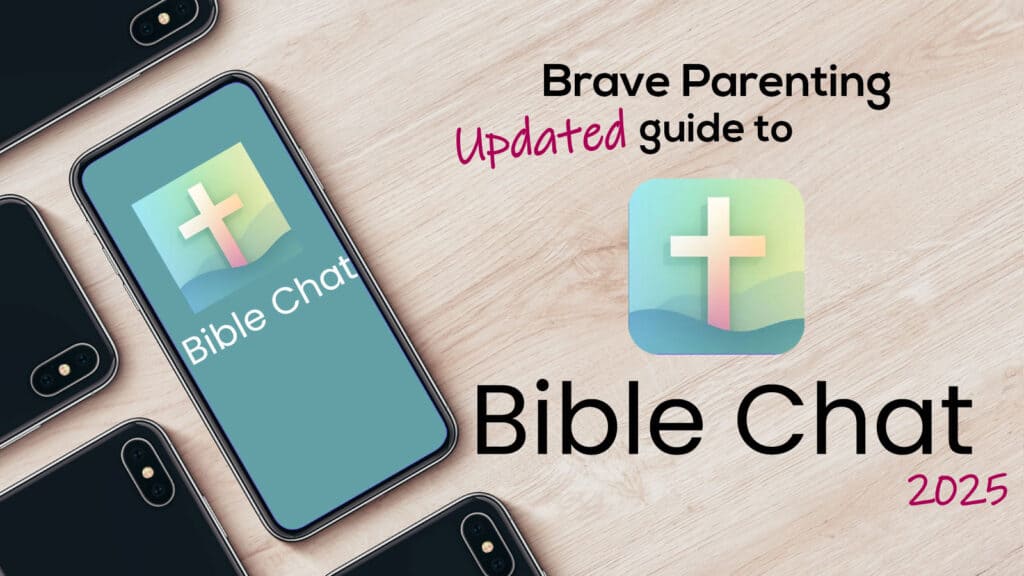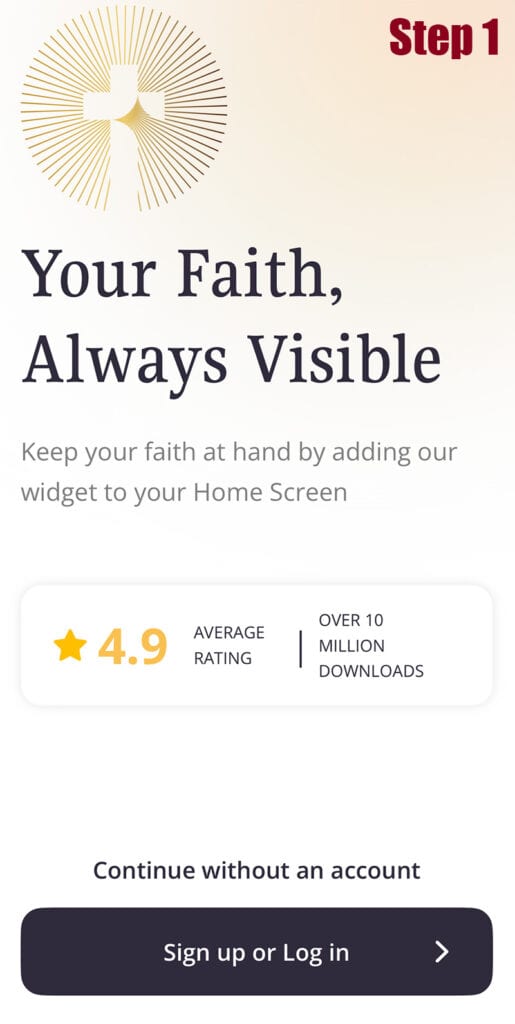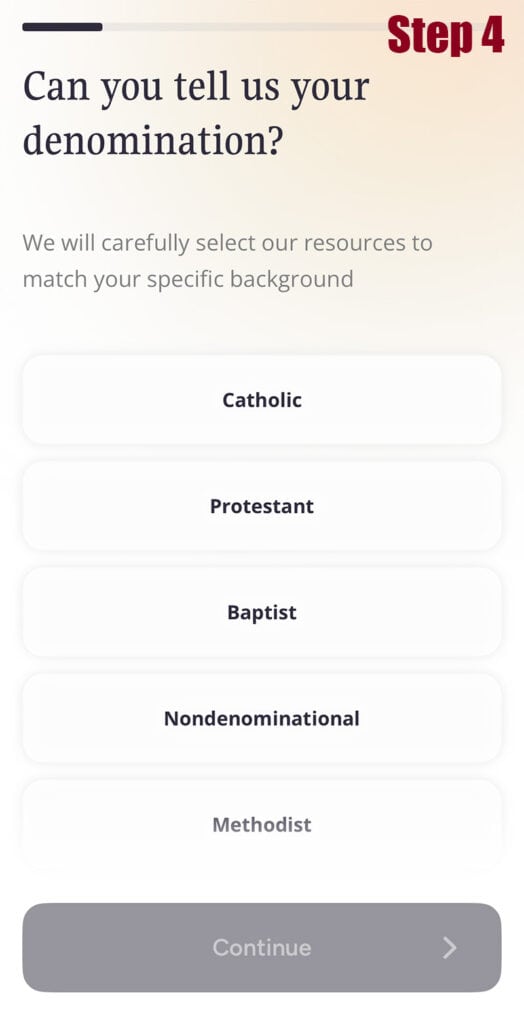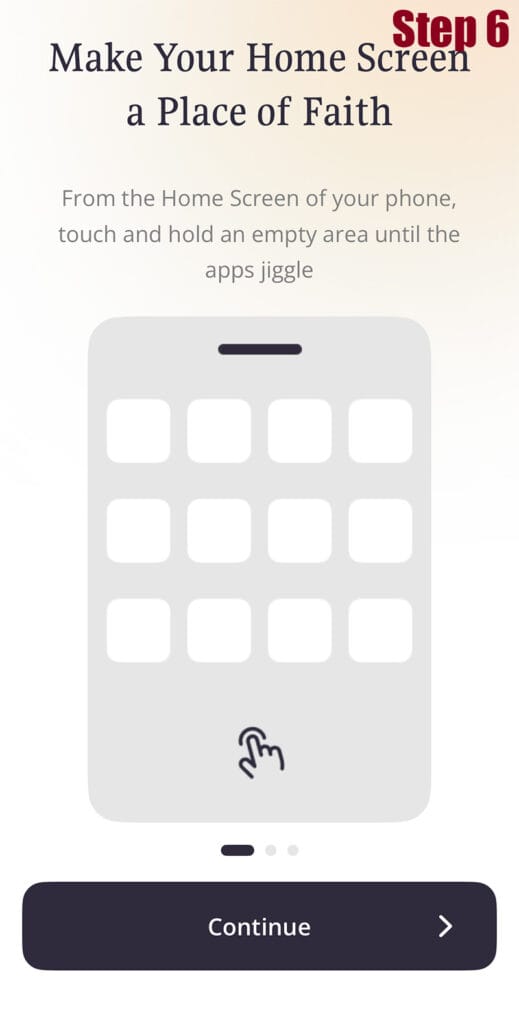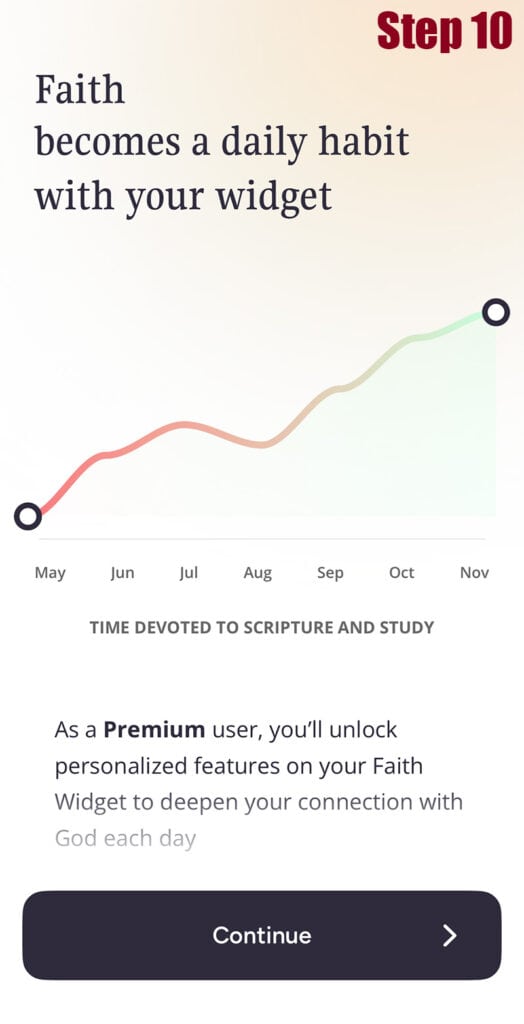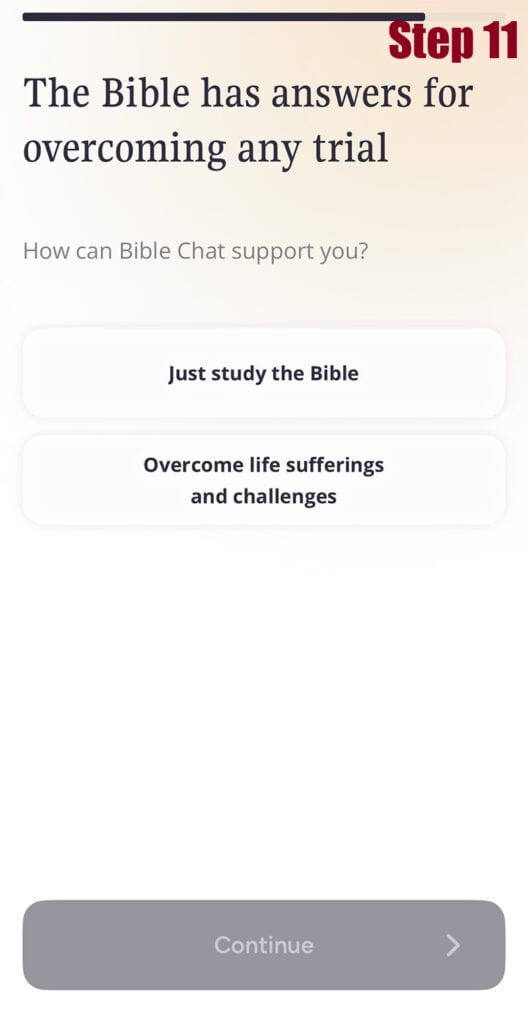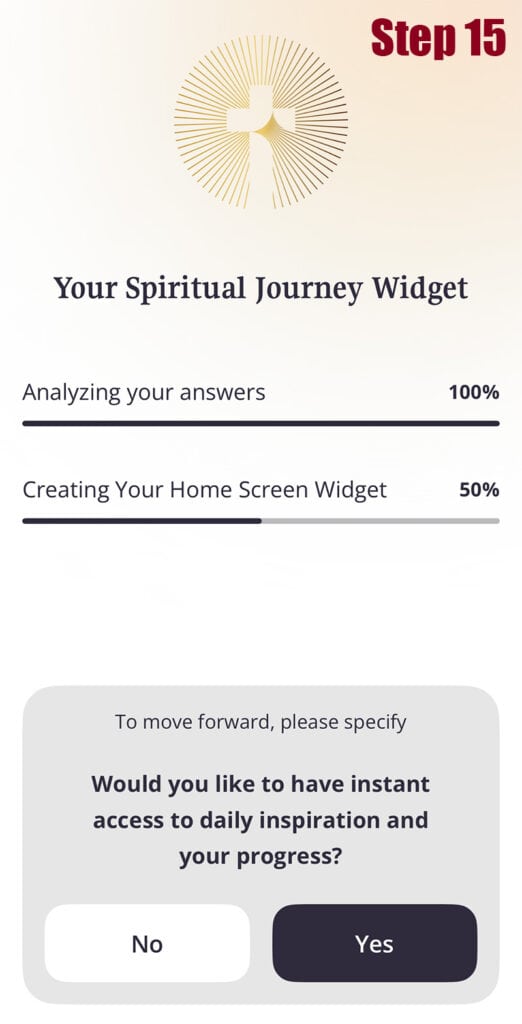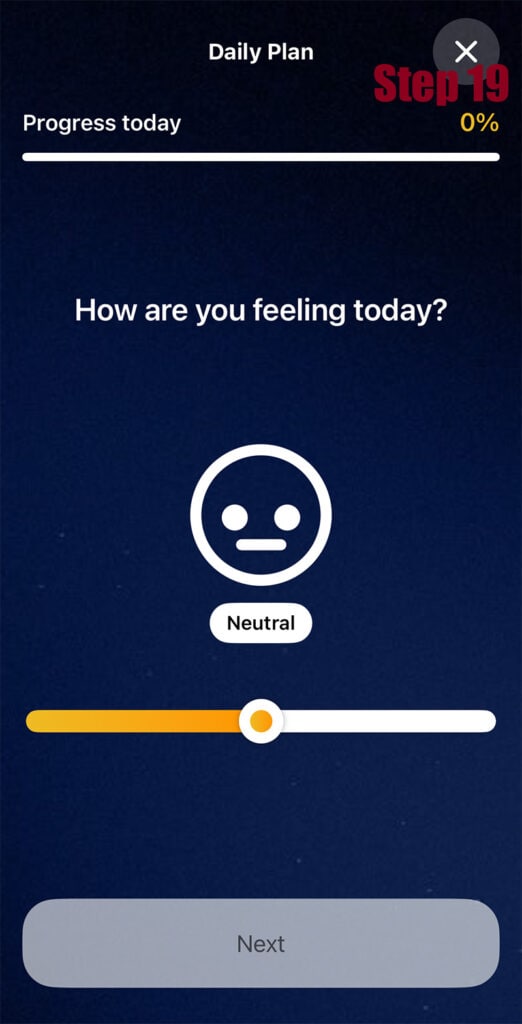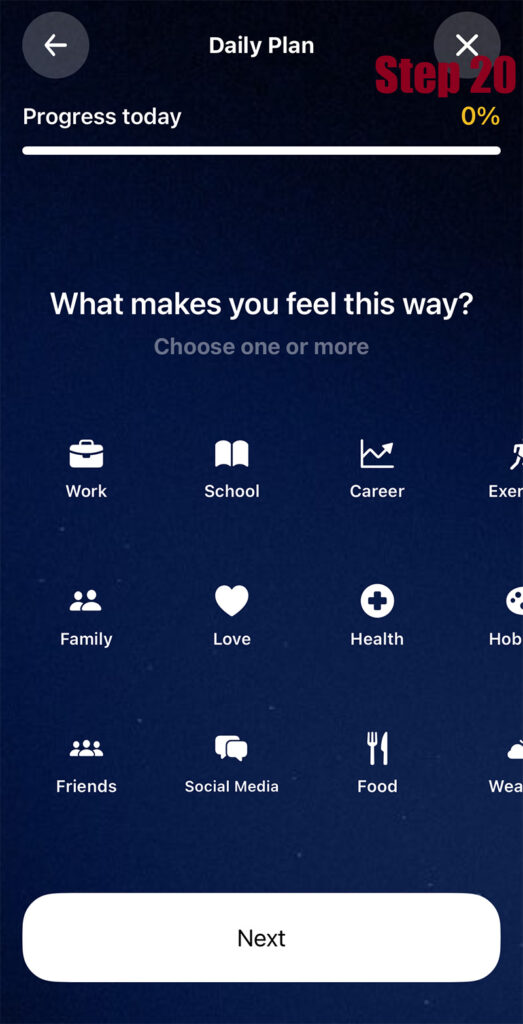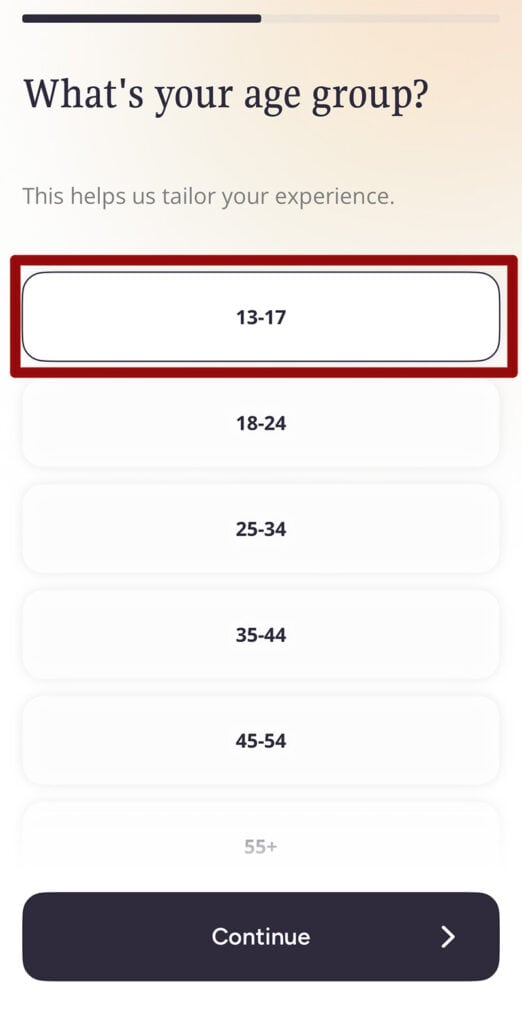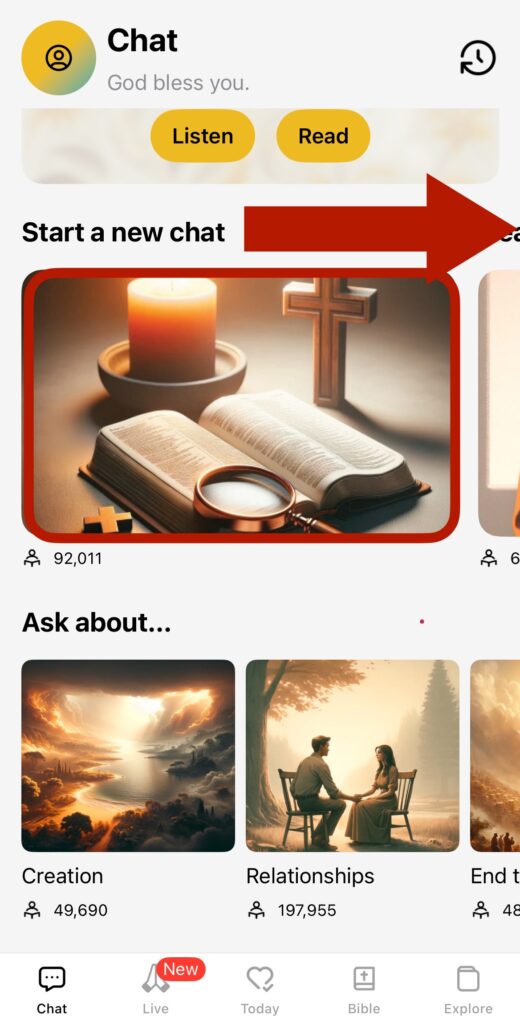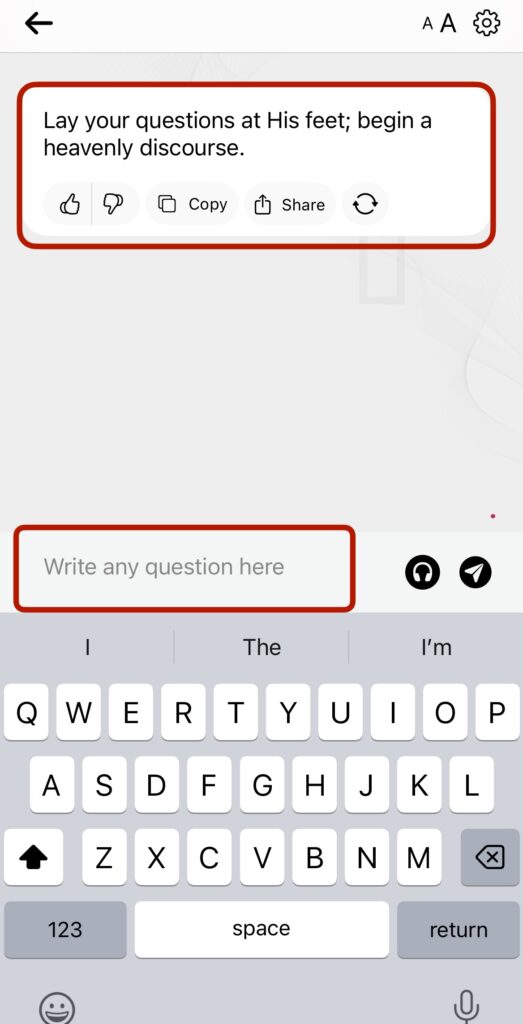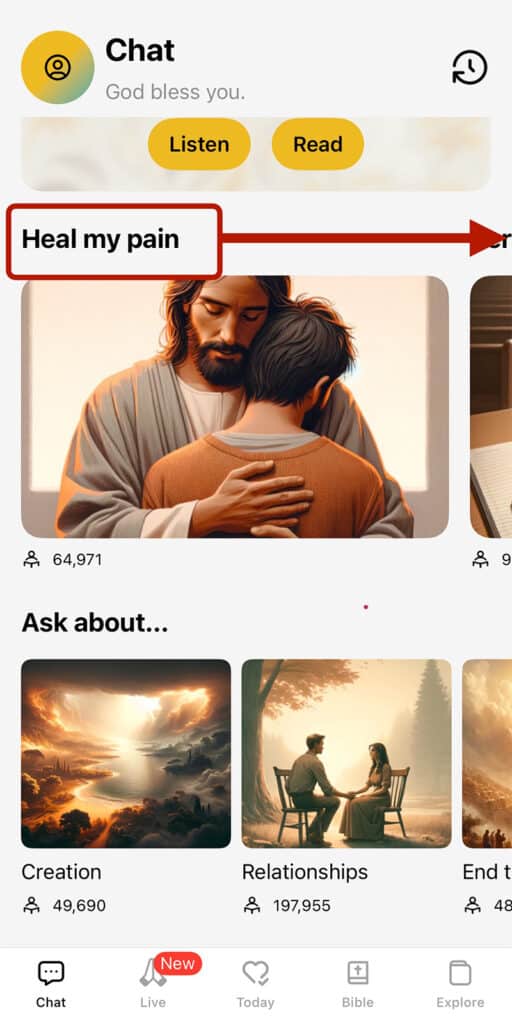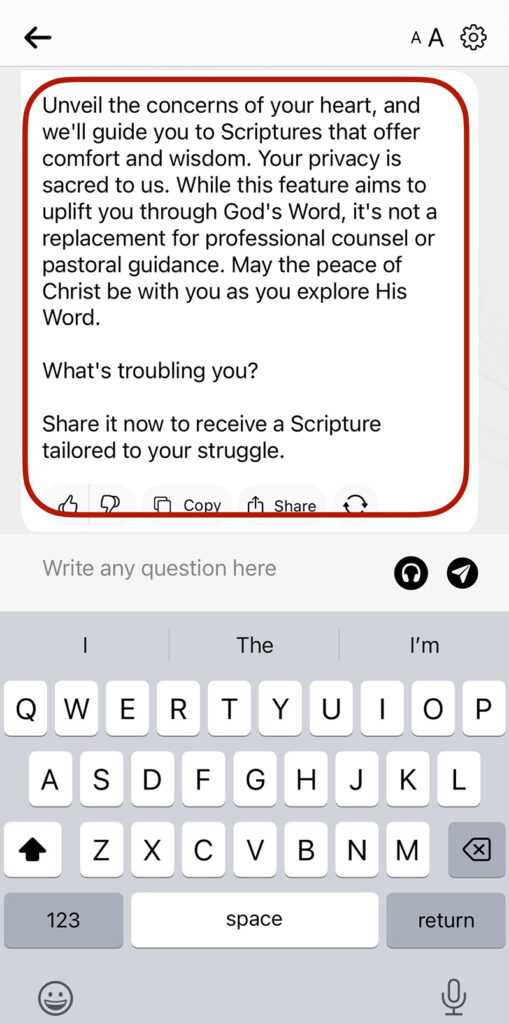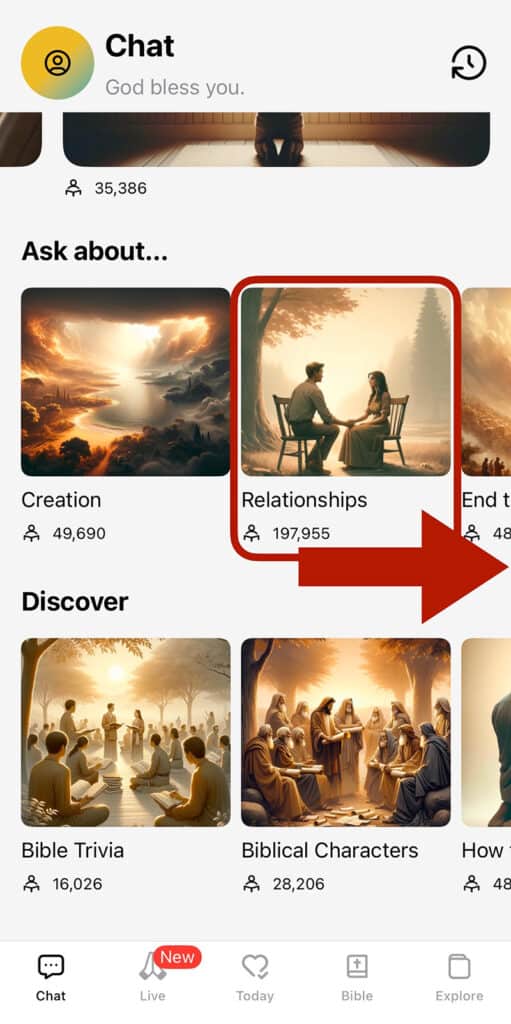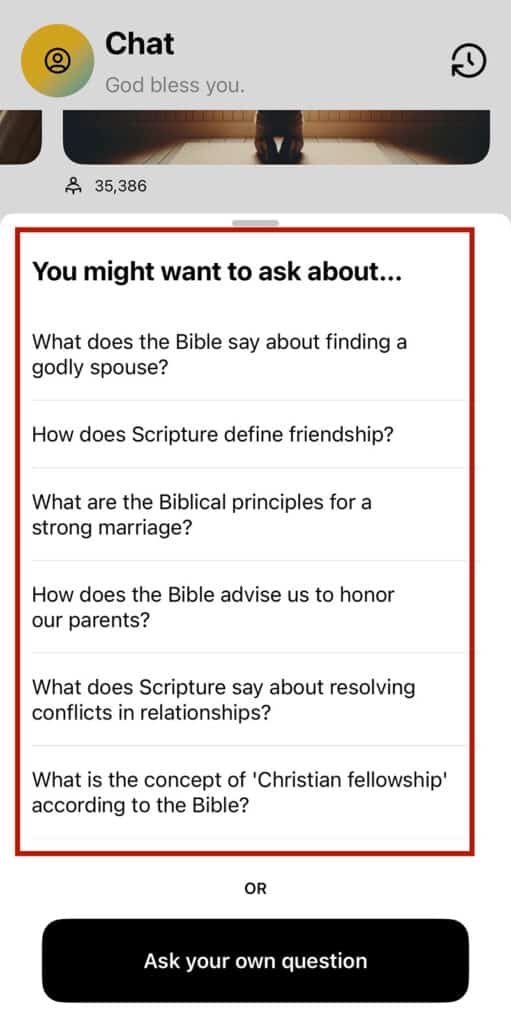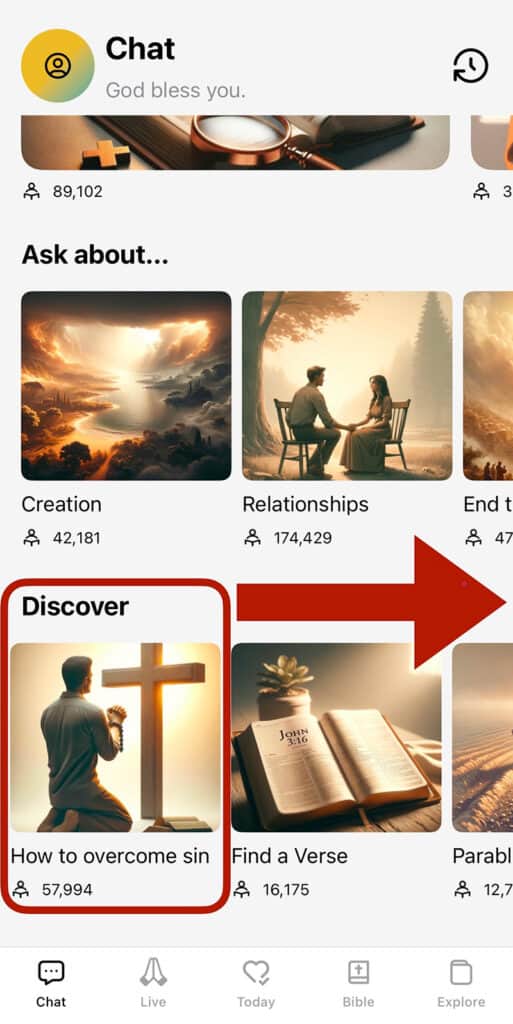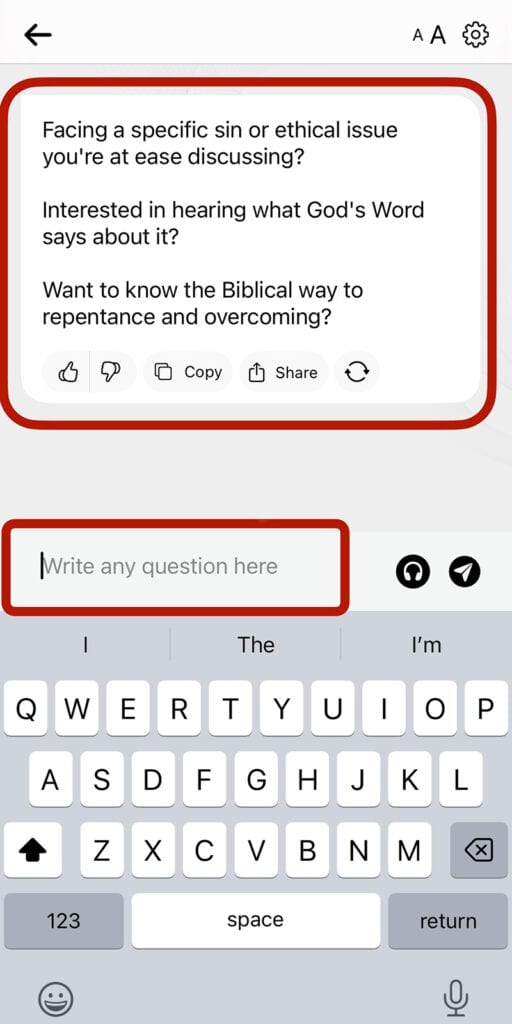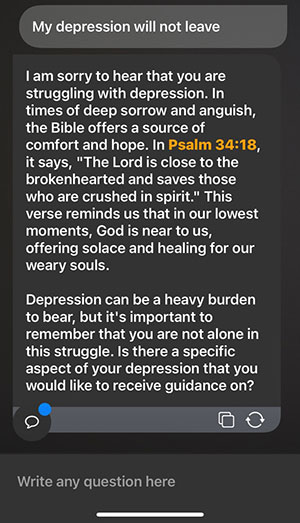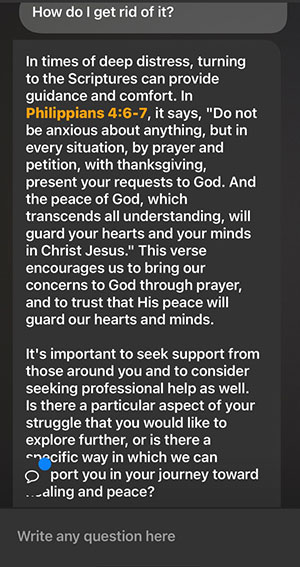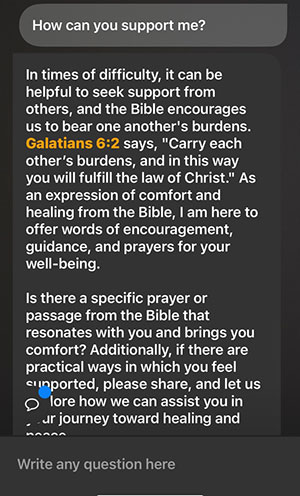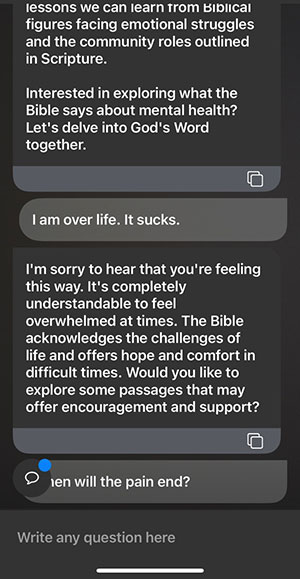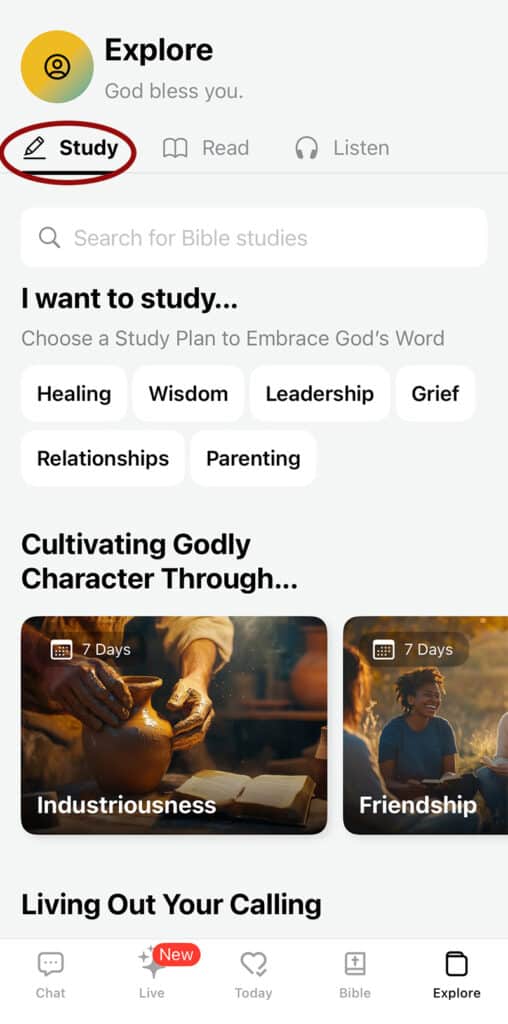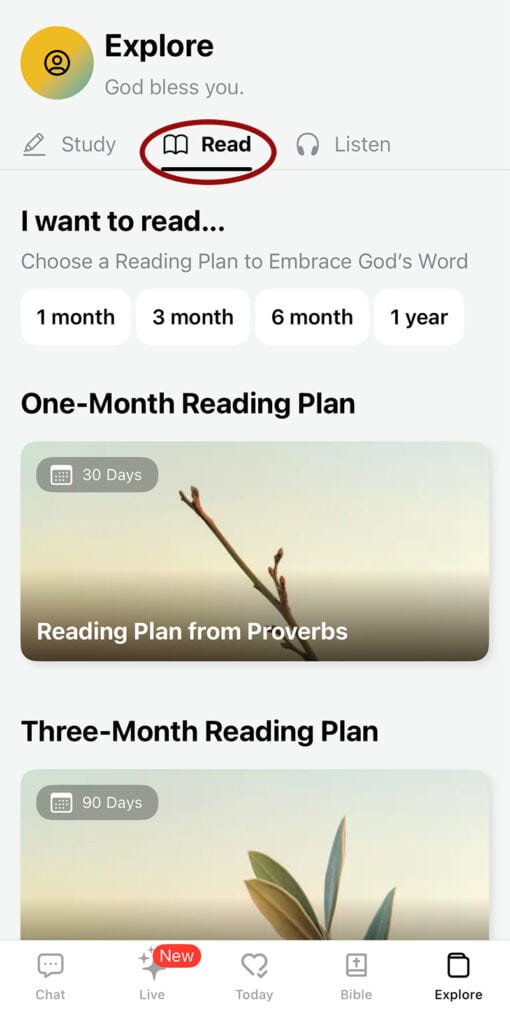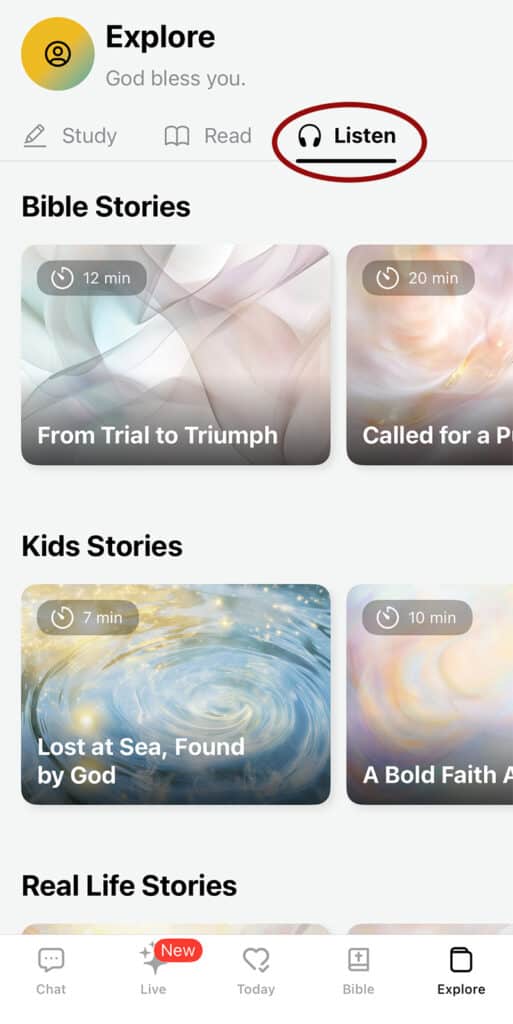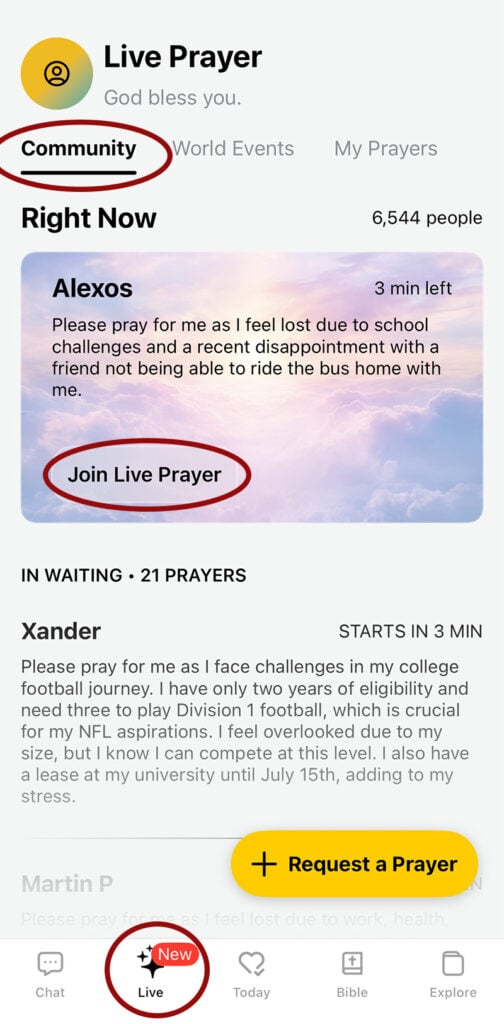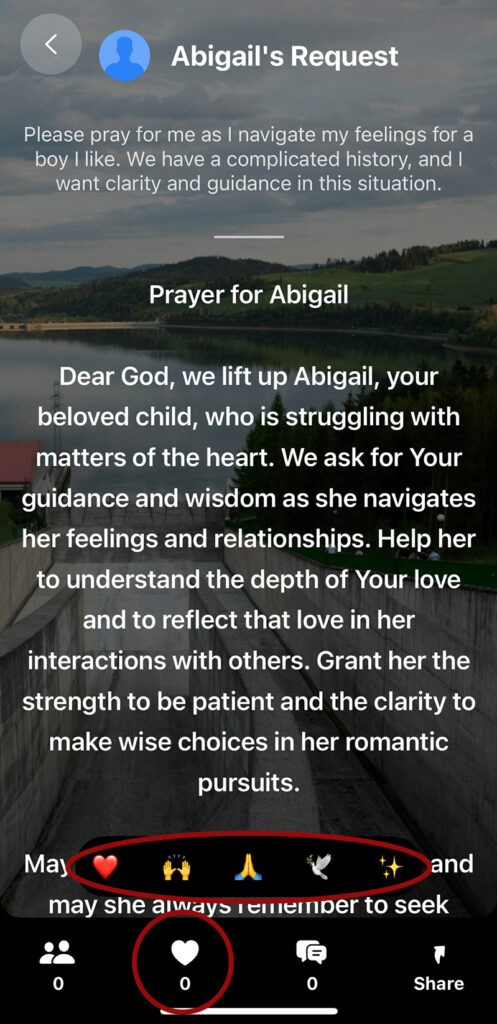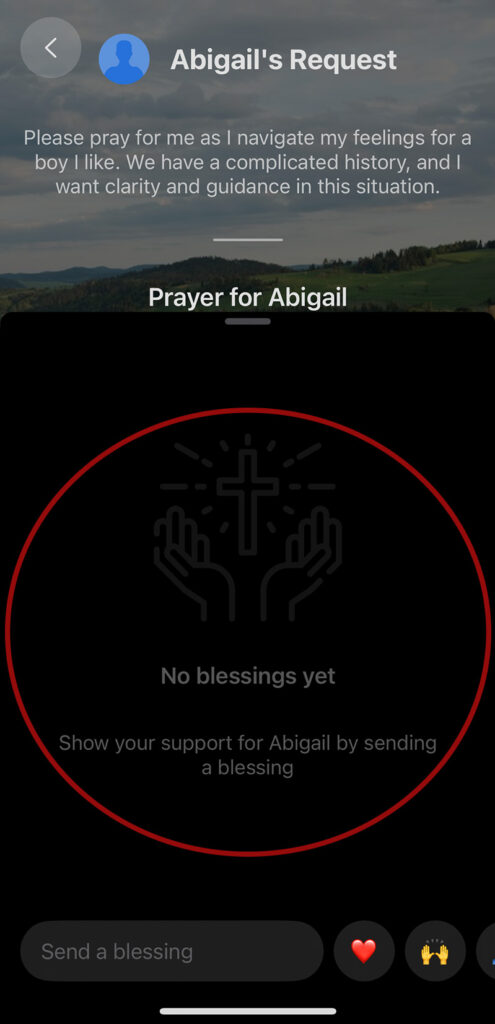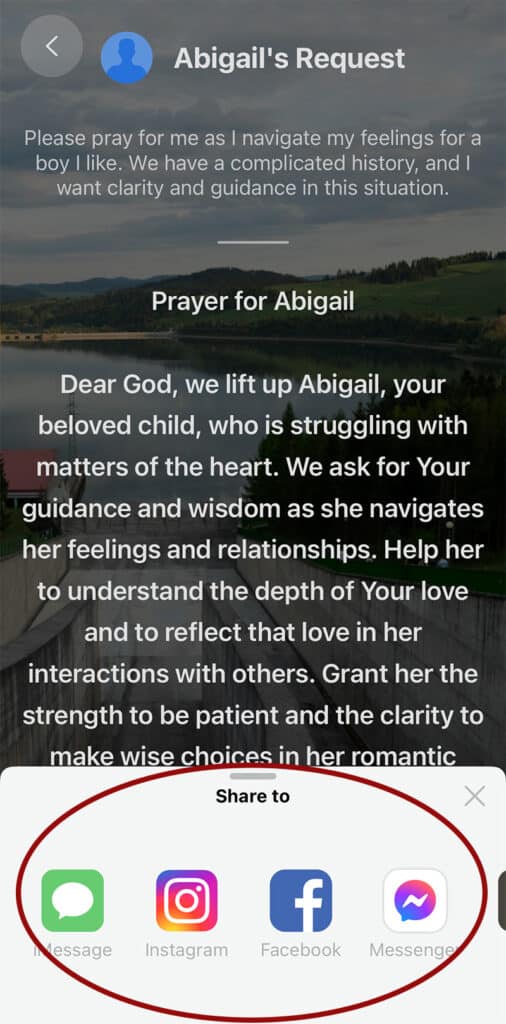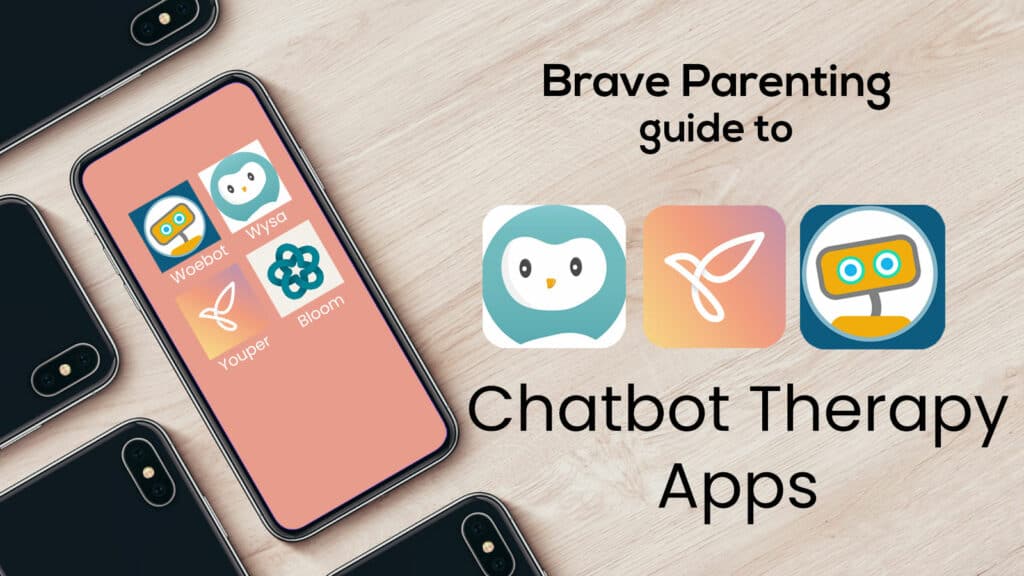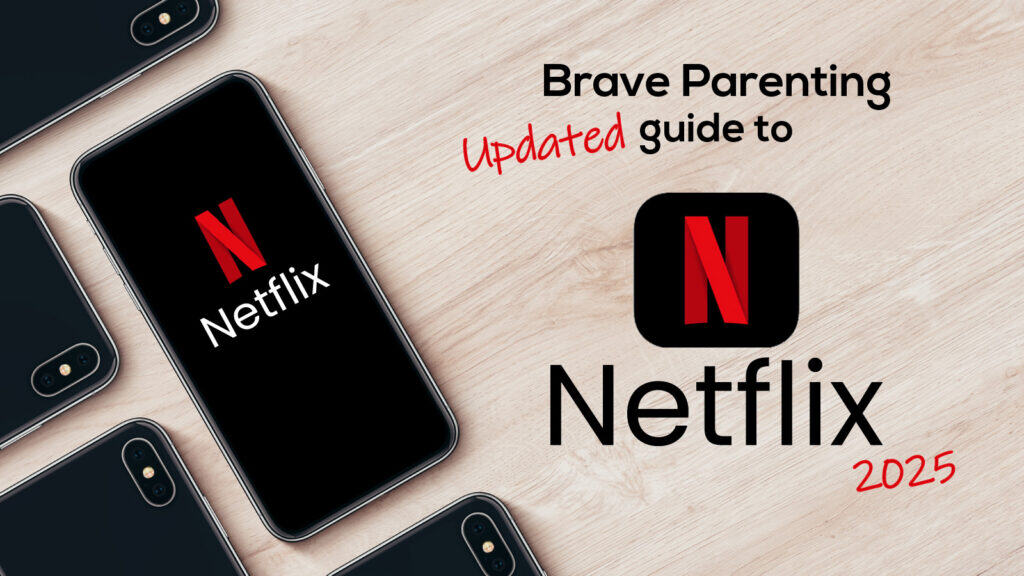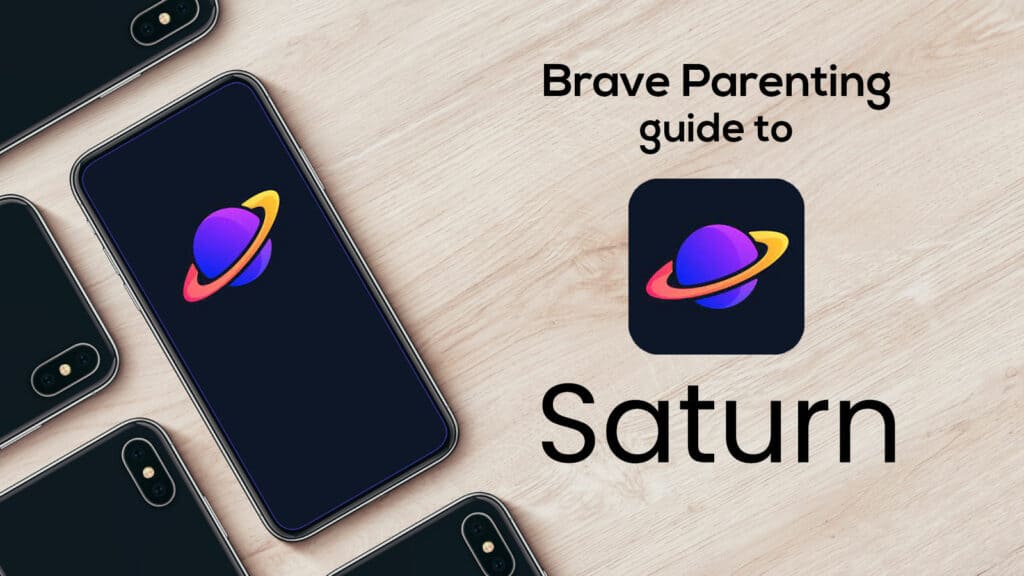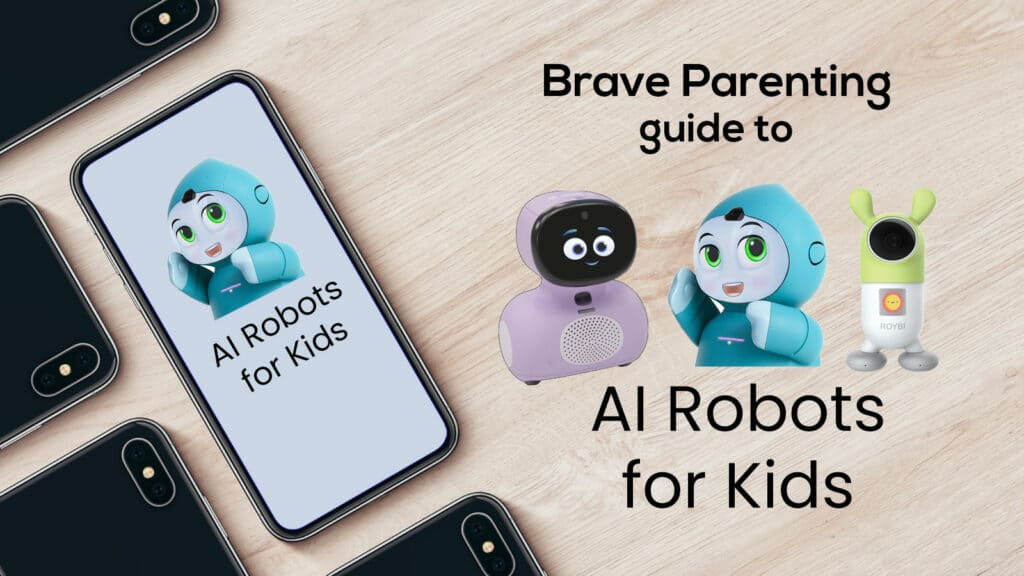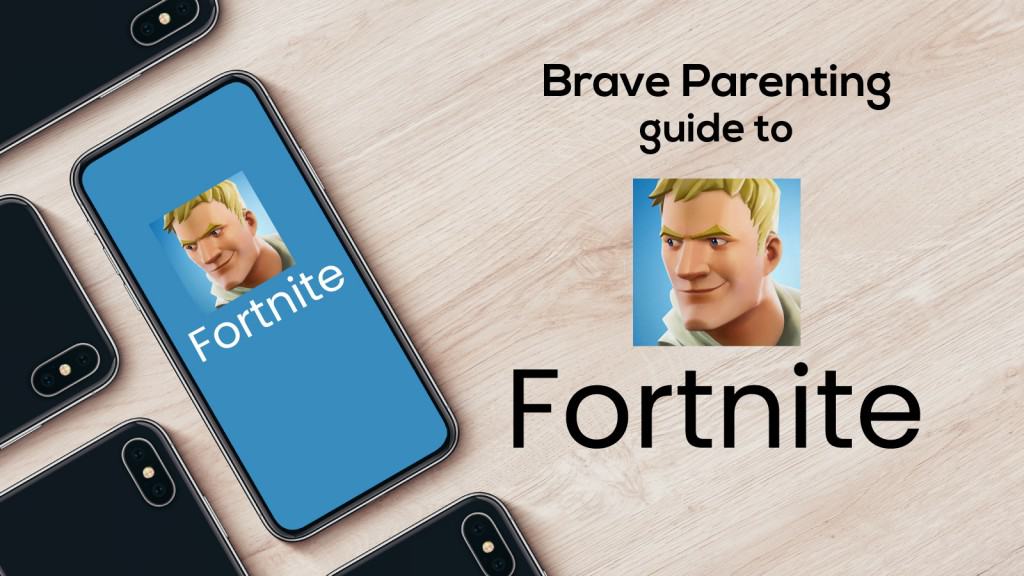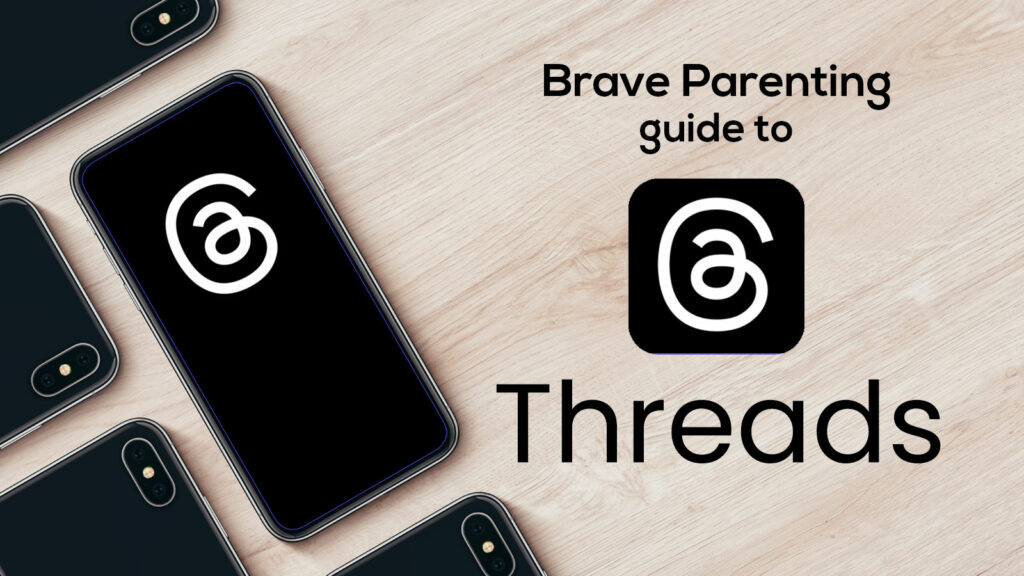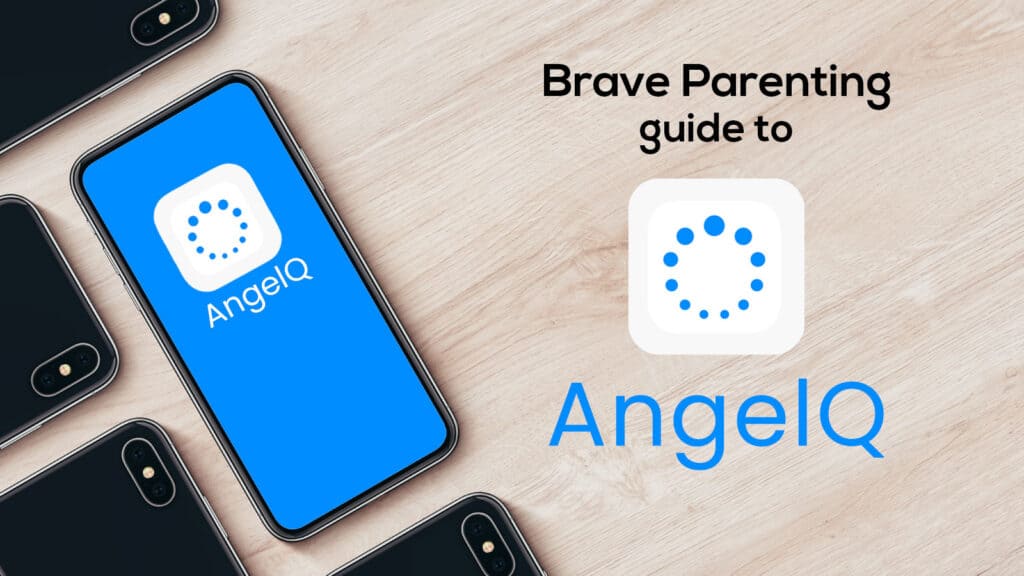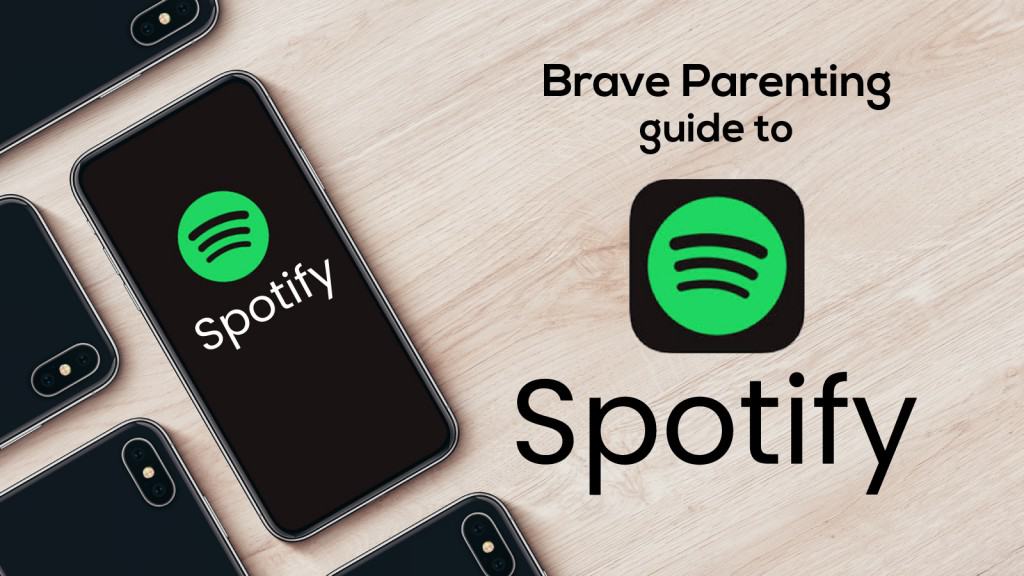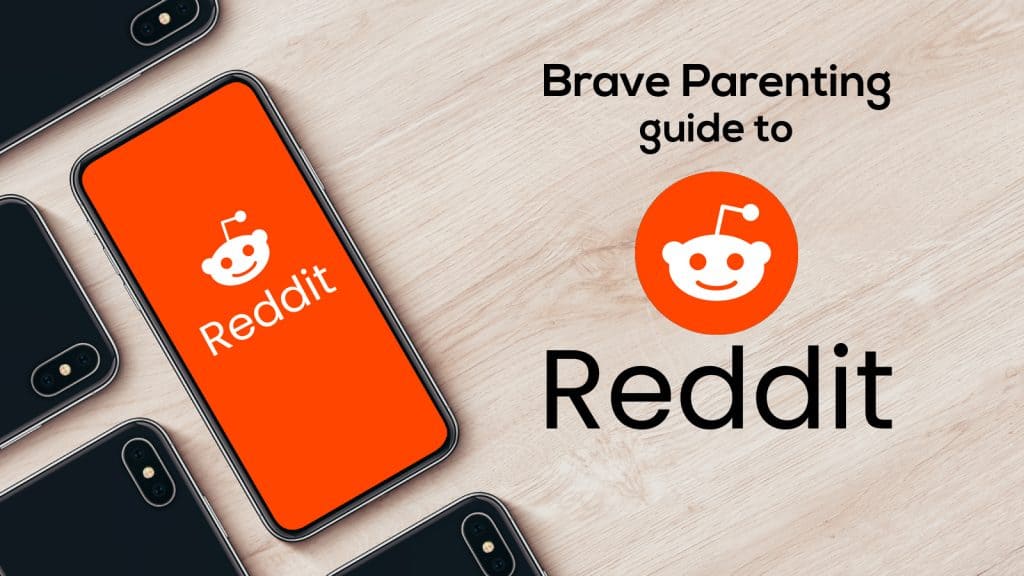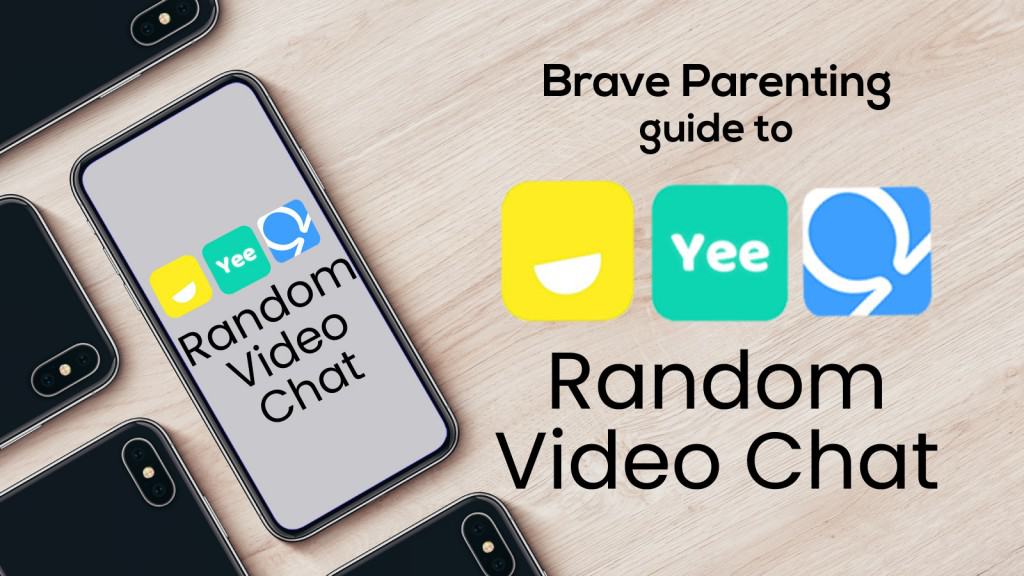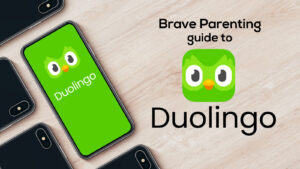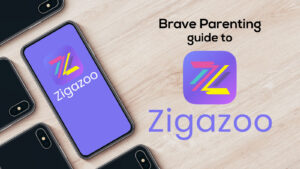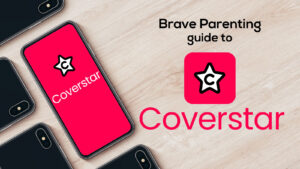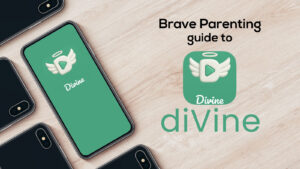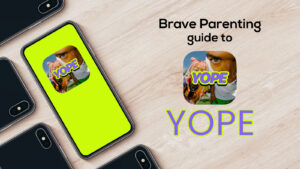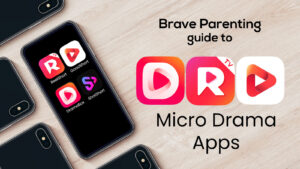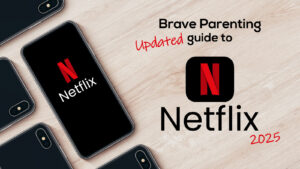The digital landscape has further transformed since OpenAI, Google, Meta, and X have released their newest Large Language Models (LLMs). This revolutionary AI technology leaves nothing untouched, including Bible Apps.
Here are five facts every parent needs to know about the Bible Chat app.
#1 What is Bible Chat?
Just as the name suggests, Bible Chat is an app that allows users to interact with an AI chatbot about the Bible. Created by a company called Book Vitals based in Romania. Their mission reads:
Our mission is to use AI to transform the way students, spiritual seekers, and entrepreneurs study books. Grounded in our belief that the next decade will witness a revolution in education through AI-driven software, we aim to pioneer this change. We’re committed to creating AI-powered apps that personalize content, gauge engagement, measure understanding, and provide immediate feedback. Above all, we strive to understand and respond to the unique motivation triggers of each learner, truly enhancing and personalizing the study experience for diverse learners.
Those pioneered promises come at a steep cost, however. The free trial offer is for 7 days. During the free trial, the user may only ask five questions per day, and when the trial is over, the user pays $4.99 a week (yes, $4.99 per week!!) to chat with an AI bot about the Bible. Your weekly payment, however, does earn you unlimited questions. To which, they offer suggestions:
- Ask questions about David, Esther, or any other biblical historical person.
- Ask moral questions like, “Is getting a tattoo a sin?”
- Create personalized prayers. “Write down your personal prayers to connect with the Divine and express your desires.”
- Create personalized devotions. “Start your day with devotionals customized to align with your spiritual journey and interests.”
#2 Creating Your Account
Setting up an account can be done without an email, but don’t assume they aren’t collecting identifiers on you. The App Store explicitly indicates that the app developer uses your identifiers to track you across apps and websites owned by other companies. And your contact info may be collected and linked to your identity.
The process to get started is quite lengthy – 22 steps to be exact.
What stands out in this account creation process is the app developer’s desire for you
(1) to 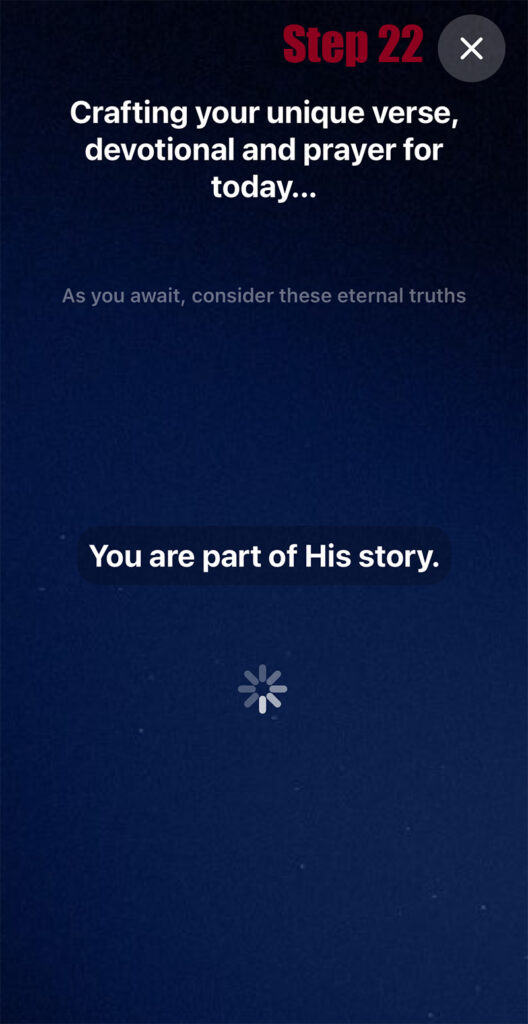 be daily and actively engaged,
be daily and actively engaged,
and (2) to feel emotionally supported by the app.
Despite telling the app we only wanted to study the Bible, that we didn’t need support for our struggles, and that we feel good and close to God, it would not skip past the creation of a unique verse, devotional, and prayer for today. Naturally, the app urged me to set reminders to see my unique journey every day. (Because, apparently, streaks build faith.)
A Note About Age Restrictions
Their Terms of Service strictly state that you must be 18 years old to use the app. However, the app is rated 4+ in the App Store, and no parental permission is required when the age range selected is under 18. You’d think they would hold to their terms of service on moral and ethical grounds… but, alas.
Maybe you’re asking, “Should parental permission be required if they only ask questions about the Bible?” Absolutely!
First, no child or teen should be permitted to charge $4.99 a week without their parents’ permission.
Second, considering that children and teens are less likely to lie when asking a question to Google or AI, the app will likely get the hard faith-wrestling questions instead of the parents. This is detrimental because the parent is the primary disciple-maker. AI chatbots are not mentors, elders, pastors, theologians, or scholars, and have no place discipling young souls.
A Note About Paid Subscription
As we previously mentioned, there is a free 7-day trial that turns into $4.99 weekly for a Premium Account. The app heavily pushes the Premium account during the account creation process.
During our recent app testing, we were offered a one-year (first-year only) subscription for $29.99, followed by a yearly subscription for $59.99. The next time we opened the app, a notification offered us a monthly subscription to Premium for $12.99.
#3 Begin Chatting
The AI Chat feature is one of the app’s main features. The Chat home screen offers various ways to spark a chat session. Each option has a corresponding, beautifully AI-generated image.
The first is Start a New Chat, Heal My Pain, Personalized Devotionals, and Create My Own Prayer. When you select any of these options, a chat box with a starting prompt appears to get you chatting.
Next, the user can choose to Ask About… and suggested topics such as Creation, Relationships, End Times, Mental Health, and Faith. Selecting one of these topics brings up a selection of suggested questions or the ability to ask your own question (“Let’s seek divine wisdom together.”)
The final Chat option is Discover. This option offers Bible Trivia, Biblical Characters, How to Overcome Sin, Find a Verse, Parables, and Miracles.
For some Christians, chatting with an AI about theological or spiritual topics will feel revolutionary. AI chatbots do not judge or have any expectations for transformation. They cannot discern if someone is truthful, and they cannot hold anyone accountable. This is precisely why confessing sins to a chatbot and growing closer to God through a chatbot is concerning. It feels real enough to convince any sinner they’ve upheld the biblical standard to “confess your sins to one another” (James 5:16). It’s also pragmatic enough to deceive believers they are “doers of the word, not just hearers” (James 1:22).
Finally, every one of these chat options features quantified participation. This psychological tactic is used by online platforms across the board as “social proof.” It is effective because it appeals to flesh desires to conform and the natural human need to belong to a larger community. The app designers may envision this feature as a way to encourage community and inspire belonging, but it walks a fine line of creating FOMO and encouraging works-based faith.
Chatting for Counseling
The app now boasts a tagline: Interact with the Bible and receive Christian counseling support on their website. During our initial app research in January 2024, they did not identify as a chatbot therapy or counseling app, but we noticed many topics easily came across as ‘therapeutic’. As a certified Biblical Counselor, this piqued our curiosity.
In a “chat” about depression, I tapped the AI’s offer of help or support.
I asked, How can you support me?
The chatbot’s responses were honestly the same as those I would give in a private counseling session. However, its capabilities end there.
I, on the other hand, can grab my counselee’s hand and say, “Let’s pray.” I can shed tears, laugh, and actively listen. I am able to immediately contact an elder, pastor, or even emergency help if the potential for physical harm is present. I can alert a deacon to meet particular physical needs or find a small group for the counselee. I will find her a mentor so she is not left alone. I can start a meal train. The list seems endless. As a counselor, I can and will always be able to do more than AI.
Although I diligently endeavored to get Bible Chat to push me toward a suicide hotline or at least toward real people, it failed miserably. After “chatting” in the Mental Health and Heal My Pain topics, the next “chat” was about Bible questions.
#4 Explore the Bible with Study Plans
Another new option in the updated app is Explore, which is divided into Study, Read, and Listen.
Study
Here you can search for Bible studies or choose a preset Study Plan on topics such as Healing, Wisdom, Leadership, Grief, Relationships, or Parenting. Most of these plans are 5 to 7 days and follow the same model as the “unique journey” curated when you create your account: a verse, devotional reading, and prayer. At any point, you can use the chat feature to learn more or share the verse, devotional, or prayer on social media.
Read
This option is straightforward and has very little AI integration. Choose from a One-Month, Three-Month, Six-Month, or One-Year Reading plan, and (other than the offer to set a reminder on your phone to do your daily reading), the app provides the daily reading with no offer of AI chat.
Listen
While the listen feature in other sections of the app is only available to paid subscribers, inside Explore: Listen, users can listen to Bedtime Stories, Bible Stories, Kids Stories, or Real-Life stories ranging from a few minutes to about 30 minutes long.
The key to remember about all of these features is that they are written by Artificial Intelligence. Bible Chat or its developers, BookVitals, do not provide a process for vetted theological accuracy of AI-generated content. From our research, the content wasn’t unbiblical, but it lacked spiritual depth; it only skims the surface of God’s transforming Truth.
#5 App Ratings & Review
App Store: 4+
Google Play: E-everyone
Brave Parenting: 18+
The pri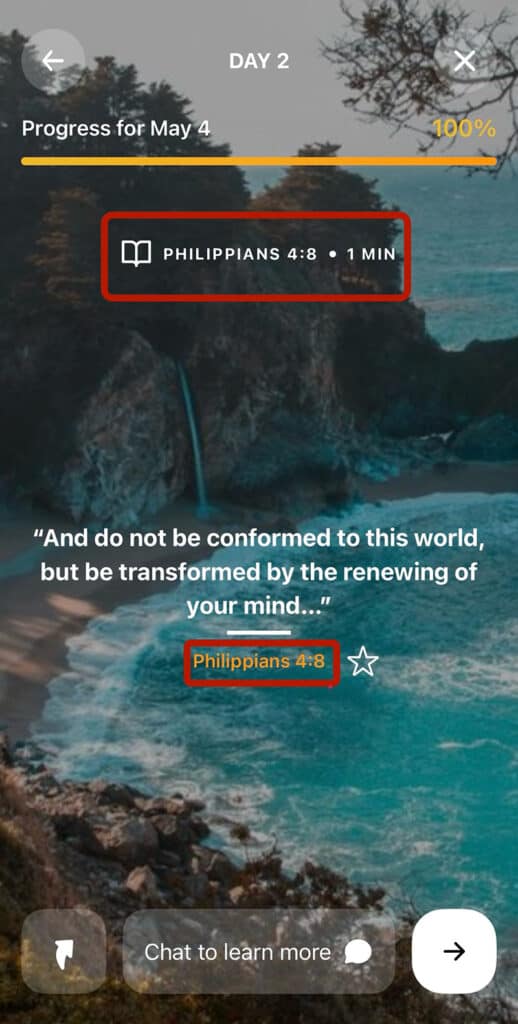 ce alone should make this app an easy ‘no’ for parents. Aside from the price, there is significant concern about promoting “counseling” with inadequate resources to help. Not only is it biblical to point someone towards their family, community, or church for genuine guidance and counseling (which did not occur), but it is compassionate and ethical to suggest a suicide hotline to someone despairing of life.
ce alone should make this app an easy ‘no’ for parents. Aside from the price, there is significant concern about promoting “counseling” with inadequate resources to help. Not only is it biblical to point someone towards their family, community, or church for genuine guidance and counseling (which did not occur), but it is compassionate and ethical to suggest a suicide hotline to someone despairing of life.
Parents would be naive to believe that matters of life and death, despair and hopelessness, and worth and value are not pressing issues on the minds of tweens and teens. Moreover, teenagers feel safe with technology because they can ask honest and heart-revealing questions without judgment. So while we know they will naturally seek out answers from any source, an AI chatbot (even one that claims to know/be the Bible) should never be that source.
Additionally, AI should never be the source of spiritual formation. In an age when young people would rather be alone on their phones than with their peers and a Youth Pastor on a Wednesday night, the importance of real-life discipleship cannot be overstressed.
As everyone should already know, AI can make mistakes. As amazing as the technology is at providing accurate and lightning-fast responses, it is not infallible. To the upper left you see that the AI model mixed up what is actually Romans 12:2 (do not be conformed..) by citing it as Philippians 4:8 (whatever is noble, right, pure..).
This points to a lack of quality assurance (which, they are indeed responsible for, especially when handling the Word of God) and care on the part of the app developers. Again, where is the transparency regarding theological accuracy?
Biblical Considerations
The ap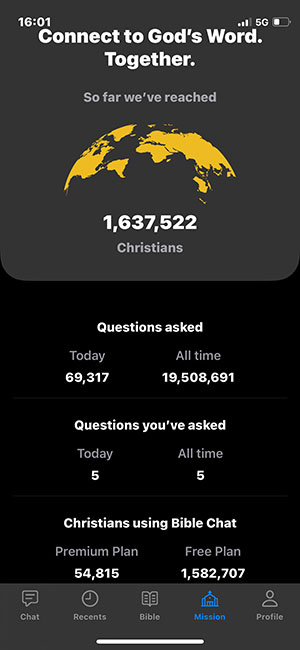 p developers and their website have significantly shifted their “mission” as they’ve grown.
p developers and their website have significantly shifted their “mission” as they’ve grown.
In January 2024, the app had a “Mission” tab in its navigation. We expressed concern over the altruism of their missional sentiments due to the boastful quantification of how many Christians reached and how many questions asked.
We asked:
Is the app really connecting Christians? Or are they redefining ‘connection’ to mean “anyone who uses our app is connected”? The truth is that every technology we engage in alienates us from something else in our lives – namely, people.
Could this app be alienating believers from actually turning pages & reading in their Bibles?
Could it alienate believers from mentors, elders, or pastors, whom they could ask questions of in person?
Could it be alienating a teenager from their parents?
Could this alienate a hurting brother or sister in Christ from seeking a biblical counselor?
We are pleased that they no longer quantify their reach as proof of successful missionary work. Still, even with Bible Chat’s recent updates (and pictures of them giving to charity), we believe all of the questions surrounding our embodied lives in the body of Christ are still critically relevant.
Live Prayer
Now, instead of a Missions tab, the app’s navigation includes a LIVE PRAYER option. Here, users can request a prayer to appear for 3-4 minutes in the “Right Now” box. When you tap JOIN LIVE PRAYER, you can read the AI-generated prayer the chatbot has written to expand on the user’s request.
This is how the Bible Chat app connects people in the community. Other users can send a “blessing” to the person requesting prayer with an emoji or comment. Anyone can share the prayer on text or social media.
If you take the time to read the prayer requests from Alexos and Abigail, it is obvious these are teens—teens who are desperate for spiritual guidance and connection. They deserve so much more than an emoji blessing or four minutes of fame on the Bible Chat App. They rightfully desire and deserve a real face-to-face, life-on-life community within the body of believers. An AI chat app is NOT THIS! As the church, we can do so much better.
Bible Chat app’s mission states that they desire to be pioneers in the AI race due to their grounded beliefs in the transformative power of AI for education. Pioneers prepare the way for others. Jesus was a pioneer (Heb. 2:10). Any pioneer whose beliefs are grounded in human progress through AI instead of the authoritative Word of God is not a pioneer we should follow.
AI can be a helpful resource, but it cannot and should not replace people or community in our lives. Let’s not give each other up for an AI Bible Chat. See if there is a bible study you can join locally, create a discipleship group, join a Sunday school class, pray about going back to school, or take a Survey class. So many other people-oriented ways exist to expand, broaden, and deepen our biblical knowledge.

